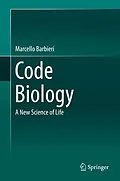The genetic code appeared on Earth at the origin of life, and the codes of culture arrived almost four billion years later. For a long time it has been assumed that these are the only codes that exist in Nature, and if that were true we would have to conclude that codes are extraordinary exceptions that appeared only at the beginning and at the end of the history of life. In reality, various other organic codes have been discovered in the past few decades and it is likely that more will come to light in the future. The existence of many organic codes in Nature is therefore an experimental fact, but also more than that. It is one of those facts that have extraordinary implications. In this book it is shown that the genetic code was a precondition for the origin of the first cells, the signal transduction codes divided the first cells into three primary kingdoms (Archaea, Bacteria and Eukarya), the splicing codes were instrumental to the origin of the eukaryotic nucleus, the histone code provided a new regulation system in eukaryotic genomes, and the cytoskeleton codes allowed the Eukarya to perform internal movements, including those of mitosis and meiosis. It is shown, furthermore, that organic codes had a key role in multicellular life, in particular in the origin of animals, the origin of mind and the origin of language. The great events of macroevolution, in other words, were associated with the appearance of new organic codes,and we can easily understand why. The reason is that a new code brings into existence something that has never existed before because it creates arbitrary associations, relationships that are not determined by physical necessity. Another outstanding implication is the fact that codes involve meaning and we need therefore to introduce in biology, with the standard methods of science, not only the concept of biological information but also that of biological meaning. The research on biological codes, in conclusion, is bringing to light new mechanisms in evolution and new fundamental concepts in science. This research is the field of Code Biology, the study of all codes of life, from the genetic code to the codes of culture, from the origin of life to the origin of man.
Autorentext
Marcello Barbieri (born 1940) is professor of embryology at the University of Ferrara, Italy. He has conducted research on embryonic development and ribosome crystallization at the Medical Research Council in Cambridge, UK, the National Institutes of Health in Bethesda, USA, and the Max-Planck-Institut für Molekulare Genetik in Berlin. He has published books on embryology and evolution, and has taught biophysics, molecular embryology and theoretical biology respectively at the Universities of Bologna, Sassari and Turin. His research interests include embryology, evolution and biosemiotics. He is Editor-in-Chief of the journal Biosemiotics, was a co-Editor of the Springer Book Series in Biosemiotics.
Zusammenfassung
This book is the study of all codes of life with the standard methods of science. The genetic code and the codes of culture have been known for a long time and represent the historical foundation of this book. What is really new in this field is the study of all codes that came after the genetic code and before the codes of culture. The existence of these organic codes, however, is not only a major experimental fact. It is one of those facts that have extraordinary theoretical implications. The first is that most events of macroevolution were associated with the origin of new organic codes, and this gives us a completely new reconstruction of the history of life. The second implication is that codes involve meaning and we need therefore to introduce in biology not only the concept of information but also the concept of biological meaning. The third theoretical implication comes from the fact that the organic codes have been highly conserved in evolution, which means that they are the greatest invariants of life. The study of the organic codes, in short, is bringing to light new mechanisms that have operated in the history of life and new fundamental concepts in biology.
Inhalt
Acknowledgments
Introductory Chapter.- The Life and Education of Jakob von Uexküll. The Basis of the Environmental Theory.- The Subjective World of the Umwelt.- The Structure of the Umwelt.- Environment and Meaning.- Influences and Interpretations of the Work of Uexküll.- Conclusion. References.- Index.
